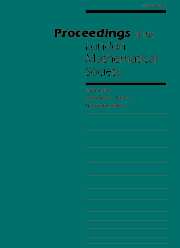Crossref Citations
This article has been cited by the following publications. This list is generated based on data provided by
Crossref.
Guy, Richard K.
2004.
Unsolved Problems in Number Theory.
Vol. 1,
Issue. ,
p.
3.
Granville, Andrew
2010.
Different Approaches to the Distribution of Primes.
Milan Journal of Mathematics,
Vol. 78,
Issue. 1,
p.
65.
Narkiewicz, Władysław
2012.
Rational Number Theory in the 20th Century.
p.
307.
Mezroui, Soufiane
Azizi, Abdelmalek
and
Ziane, M'hammed
2015.
Quaternary quartic forms representing infinitely many prime squares.
Asian-European Journal of Mathematics,
Vol. 08,
Issue. 03,
p.
1550062.
Dartyge, Cécile
2015.
Le problème de Tchébychev pour le douzième polynôme cyclotomique.
Proceedings of the London Mathematical Society,
Vol. 111,
Issue. 1,
p.
1.
Dieulefait, Luis Víctor
Urroz, Jorge Jiménez
and
Ribet, Kenneth Alan
2015.
Modular forms with large coefficient fields via congruences.
Research in Number Theory,
Vol. 1,
Issue. 1,
Frantzikinakis, Nikos
and
Host, Bernard
2016.
Higher order Fourier analysis of multiplicative functions and applications.
Journal of the American Mathematical Society,
Vol. 30,
Issue. 1,
p.
67.
Horesh, Tal
and
Nevo, Amos
2018.
Prime points in orbits: Some instances of the Bourgain–Gamburd–Sarnak conjecture.
Journal of Number Theory,
Vol. 193,
Issue. ,
p.
1.
Blomer, Valentin
2018.
Higher order divisor problems.
Mathematische Zeitschrift,
Vol. 290,
Issue. 3-4,
p.
937.
MAYNARD, JAMES
2020.
PRIMES REPRESENTED BY INCOMPLETE NORM FORMS.
Forum of Mathematics, Pi,
Vol. 8,
Issue. ,
Lam, Peter Cho‐Ho
Schindler, Damaris
and
Xiao, Stanley Yao
2020.
On prime values of binary quadratic forms with a thin variable.
Journal of the London Mathematical Society,
Vol. 102,
Issue. 2,
p.
749.
Merikoski, Jori
2022.
A cubic analogue of the Friedlander–Iwaniec spin over primes.
Mathematische Zeitschrift,
Vol. 300,
Issue. 3,
p.
2809.
Majumdar, Dipramit
and
Sury, B.
2022.
Cyclic cubic extensions of ℚ.
International Journal of Number Theory,
Vol. 18,
Issue. 09,
p.
1929.
Granville, Andrew
2023.
Missing digits and good approximations.
Bulletin of the American Mathematical Society,
Merikoski, Jori
2023.
The polynomials X2+(Y2+1)2$X^2+(Y^2+1)^2$ and X2+(Y3+Z3)2$X^{2} + (Y^3+Z^3)^2$ also capture their primes.
Proceedings of the London Mathematical Society,
Vol. 127,
Issue. 4,
p.
1057.
HIRAKAWA, Yoshinosuke
2024.
Primes of the form $X^{3} + NY^{3}$ and a family of non-singular plane curves which violate the local-global principle.
Journal of the Mathematical Society of Japan,
Vol. 76,
Issue. 2,
Merikoski, Jori
2024.
Exceptional characters and prime numbers in sparse sets.
Algebra & Number Theory,
Vol. 18,
Issue. 7,
p.
1305.
Xiao, Stanley Yao
2024.
Prime values of f(a,b2) and f(a,p2), f
quadratic.
Algebra & Number Theory,
Vol. 18,
Issue. 9,
p.
1619.
Jędrzejak, Tomasz
2025.
On the factor rings of Z[n3].
Journal of Number Theory,
Vol. 275,
Issue. ,
p.
104.
Shute, Alec
2025.
POLYNOMIALS REPRESENTED BY NORM FORMS VIA THE BETA SIEVE.
Journal of the Institute of Mathematics of Jussieu,
p.
1.


